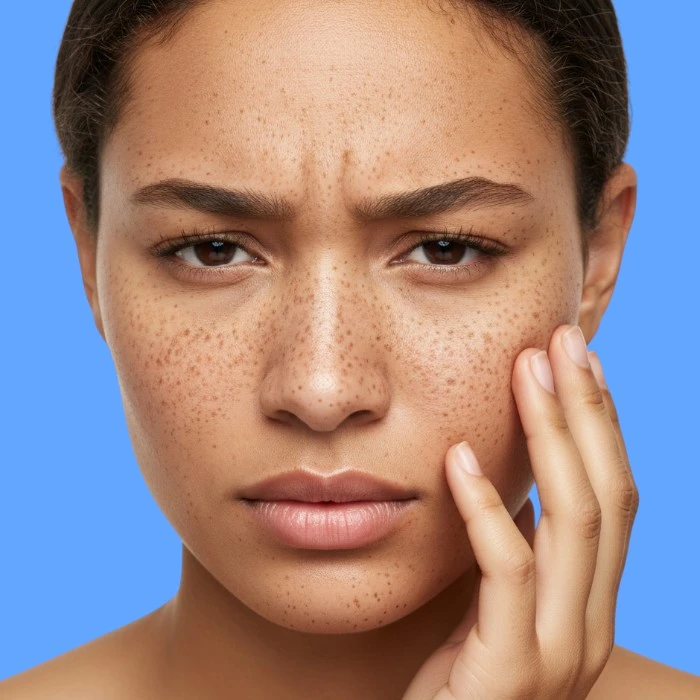what is freckles disease?
Freckles are small flat spots that appear on the skin, usually brown or red, and often show up in sun-exposed areas like the face, shoulders, and arms.
These spots result from increased concentration of melanin pigment in the skin. They are not painful or harmful, but can be cosmetically bothersome for some people.
what are the causes of freckles disease?
There are several common causes of this condition, including:
- Direct exposure to sunlight for long periods.
- Genetic factors affecting melanin production.
- Fair skin that is more sensitive to sunlight.
- Imbalance in melanin distribution in the skin.
- Hormonal changes such as pregnancy or puberty.
- Repeated sunburns.
- Rare skin disorders like xeroderma pigmentosum.
- Use of certain medications that affect the skin.
what are the common symptoms of freckles?

There are several common symptoms that patients may experience, including:
- Small flat spots that are brown or red.
- Spots appearing in sun-exposed areas of the skin.
- No pain or itching in the spots.
- Color changes in the spots depending on seasons, especially summer.
- Recurrence of spots after sun exposure.
- Spots are not raised above the skin surface.
- Variation in spot size from person to person.
- Some spots fade in winter and reappear in summer.
when should you see a doctor?
It is recommended to consult a doctor promptly if any of the following occur:
- Sudden change in the shape or color of the spots.
- Appearance of spots in areas not exposed to sunlight.
- Bleeding or itching in freckled areas.
- Unusual increase in the number of spots.
- Multiple colors in the same spot area.
- Freckles appearing in children along with other symptoms like fever.
- Family history of serious skin conditions.
- Suspicion that the spots may indicate skin cancer.
what are the treatment methods for freckles?
There are several ways to treat the condition, including:
- Using skin-lightening creams containing hydroquinone or retinoids.
- Laser therapy to break down melanin pigment.
- Chemical peels to stimulate new skin growth.
- Cryosurgery using liquid nitrogen.
- Natural remedies like lemon, turmeric, or aloe vera gel.
- Daily use of sunscreen to prevent new spots.
- Avoiding direct sun exposure.
- Moisturizing the skin with products containing vitamin E.
can freckles be cured?
Freckles are not a chronic disease and can be reduced or completely removed with appropriate treatments.
Recovery speed depends on skin type, sun exposure level, and commitment to treatment and ongoing prevention.
what are the prevention tips for freckles?
There are several tips to help prevent the condition, including:
- Daily use of sunscreen even on cloudy days.
- Wearing hats and sunglasses when going out.
- Avoiding sun exposure during peak hours.
- Using skincare products suitable for your skin type.
- Regularly moisturizing the skin.
- Eating foods rich in antioxidants.
- Avoiding products with irritating ingredients.
- Consulting a doctor when new spots appear.
what are the possible complications of freckles?
Some complications may occur if treatment is neglected, such as:
- Increase in the number and spread of spots.
- Darkening of spot color.
- Appearance of irregular spots that may indicate health issues.
- Negative psychological impact due to cosmetic concerns.
- Difficulty distinguishing freckles from other skin conditions.
- Possibility of some cases developing into skin cancer.
- Skin irritation due to unsuitable treatments.
- Permanent pigmentation that is hard to treat.
frequently asked questions about freckles
Are freckles a serious condition?
No, freckles are usually harmless but need monitoring.
Can freckles appear suddenly?
Yes, especially after sun exposure or hormonal changes.
Do freckles disappear in winter?
Some types partially fade in winter.
Are freckles hereditary?
Yes, genetics play a major role in their appearance.
article summary
Freckles are a common skin condition that appears as small painless spots, often caused by sun exposure or genetic factors.
They can be treated in various ways, both medically and naturally. Prevention is always recommended through sunscreen use and monitoring skin changes If you notice any unusual symptoms, don't hesitate to consult a doctor to ensure your skin's health.